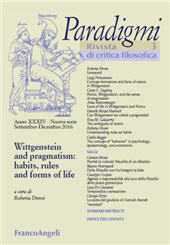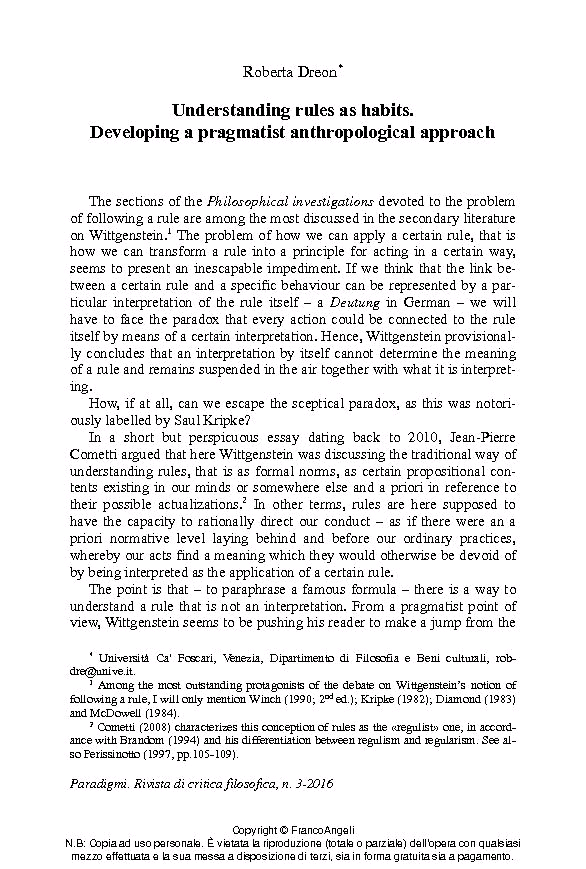Understanding rules as habits : developing a pragmatist anthropological approach
103-117 p.
Prendendo avvio dalle note riflessioni di Wittgenstein sul problema del "seguire una regola", il saggio sostiene che la proposta del filosofo austriaco potrebbe essere compresa meglio traducendo regole con abiti e intendendo questi ultimi nei termini in cui furono concepiti dai pragmatisti classici - e da John Dewey in particolare. Questo tipo di interpretazione rinforza sia il rifiuto dell'approccio intellettualistico al problema delle regole, sia l'enfasi sulla loro dimensione primariamente sociale. D'altra parte, l'autrice riconosce esplicitamente che questo tipo di lettura forza Wittgenstein a rendere chiare quali potrebbero essere le conseguenze sul piano antropologico del suo salto dalla dicotomia tra le presunte norme a priori e le loro presunte realizzazioni empiriche alle nostre pratiche ordinarie già di per sé significative.
Pertanto il saggio articola le assunzioni antropologiche che caratterizzano l'approccio pragmatista agli abiti, sottolineandone le implicazioni naturali e sociali. In conclusione l'autrice accenna alle conseguenze che questo tipo di interpretazione delle regole in termini di abiti possono avere per la questione della normatività [Testo dell'editore].
By taking Wittgenstein's well-known reflections on following a rule as its starting point, the paper suggests that what the Austrian philosopher meant by rule could better be understood in terms of habits, as these have been theorized by the classical pragmatists – and by John Dewey in particular. This kind of interpretation reinforces both the rejection of the intellectualistic approach to the issue of following rules, and the emphasis on their primarily social dimension. On the other hand, this reading also forces us to clarify what the anthropological consequences might be of Wittgenstein's leap from the dichotomy between the alleged a priori norms and their alleged empirical actualizations to our already meaningful ordinary practices.
Consequently, the paper articulates the basic anthropological assumptions characterizing the pragmatist approach to habits by stressing their natural and social implications. Finally, the author outlines what the consequences might be of this interpretation of rules in terms of habits for the question of normativity. [Publisher's Text].
Forma parte de
Paradigmi : rivista di critica filosofica : XXXIV, 3, 2016-
Artículos del mismo número (disponibles individualmente)
-
Información
Código DOI: 10.3280/PARA2016-003007
ISSN: 2035-357X
MATERIAS
KEYWORDS
- Abiti, Regole, Wittgenstein, Dewey, Antropologia
- Habits, Rules, Wittgenstein, Dewey, Anthropology



